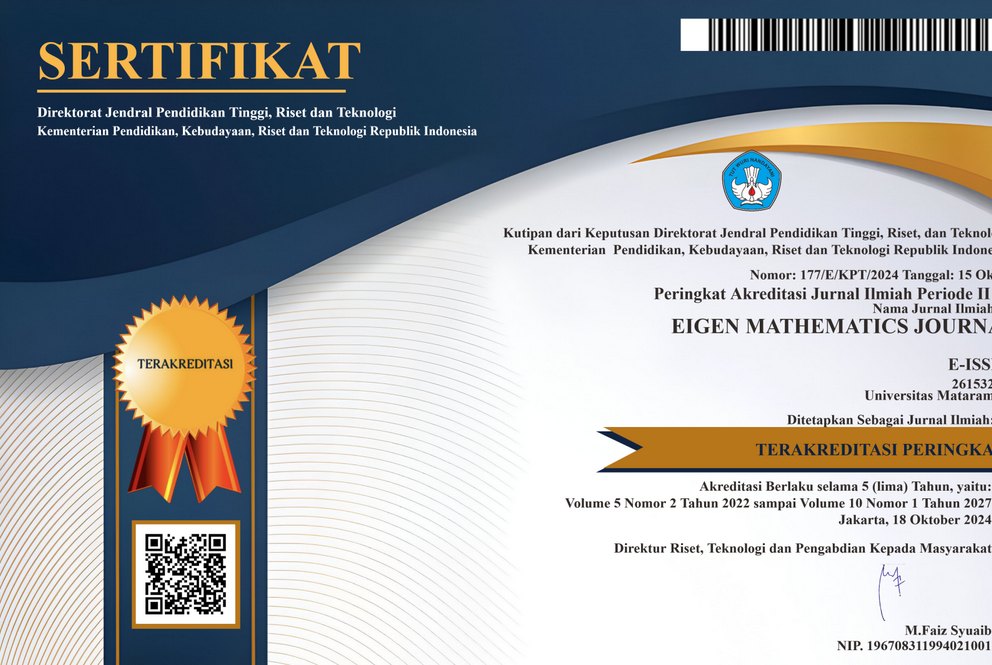The Generalized Petviashvili Iteration Method for Determined Stationary Waves Solutions of Nonlinear Schrödinger Equations with Potential Function V(x)
DOI:
https://doi.org/10.29303/emj.v5i2.146Keywords:
a generalized Petviashvili iteration method; stationary wave; Nonlinear Schrödinger equation; Bose-Einstein condensation; potential functionAbstract
This research discusses a numerical method for determining the stationary waves as a solution of Nonlinear Schrödinger (NLS) equations. In general, solutions for the partial differential equations can be solved analytically. However, most the solutions of the nonlinear wave equations are difficult to determine analytically. Therefore, a numerical approach is needed to determine the solution of the NLS equation. One of the numerical methods can be used to find the solution of the NLS equation is the Petviashvili iteration method. For case study, the NLS equation has been generated by the theory of Bose-Einstein condensation which contain potential function . To solve this problem, we generalized Petviashvili iteration method to determine the stationary waves solution easily. The most interesting result for this study is by modification of Petviashvili iteration method, we can make it easier to find a stationary solution for the nonlinear Schrodinger equation which containing the Bose-Einstein condensation potential function .References
Achdou, Y., Buera, F. J., Lions, P., & Moll, B. (2014). Partial differential equation models in macroeconomics. Journal Philosophical Transaction of The Royal Society, A 372:0397, 1–19. https://doi.org/Phil. Trans. R. Soc
Álvarez, J., & Durán, A. (2014). Journal of Computational and Applied Petviashvili type methods for traveling wave computations : I . Analysis of convergence. Journal of Computational and Applied Mathematics, 266, 39–51. https://doi.org/10.1016/j.cam.2014.01.015
Cho, Y. (2015). A modified Petviashvili method using simple stabilizing. Journal of Engineering Mathematics, 91(1), 37–57. https://doi.org/10.1007/s10665-014-9744-z
Koleva, M. N., & Vulkov, L. G. (2013). A second-order positivity preserving numerical method for Gamma equation. Applied Mathematics and Computation, 220, 722–734. https://doi.org/10.1016/j.amc.2013.06.082
Lakoba, T. I., & Yang, J. (2007). A generalized Petviashvili iteration method for scalar and vector Hamiltonian equations with arbitrary form of nonlinearity, 226, 1668–1692. https://doi.org/10.1016/j.jcp.2007.06.009
Michel Remoissenet. (2010). Analytical and Numerical Study of Soliton Collisions. Waves Called Solitons: Concepts and Experiments, Springer- Verlag (1999).
Nisar, K. S., Ali, K. K., Inc, M., Mehanna, M. S., Rezazadeh, H., & Akinyemi, L. (2022). New solutions for the generalized resonant nonlinear Schrödinger equation. Results in Physics, 33(November 2021). https://doi.org/10.1016/j.rinp.2021.105153
Pelinovsky & Stepanyants, Y. A. (2004). Convergences of Petviashvili’s Iteration Method for Numerical Approximation of Stationary Solutions of Nonlinear Wave Equations. SIAM J, 42(2004), 1110–1127.
Rezazadeh, H., Ullah, N., Akinyemi, L., Shah, A., Mirhosseini-Alizamin, S. M., Chu, Y. M., & Ahmad, H. (2021). Optical soliton solutions of the generalized non-autonomous nonlinear Schrödinger equations by the new Kudryashov’s method. Results in Physics, 24. https://doi.org/10.1016/j.rinp.2021.104179
Serkin, V. N., & Hasegawa, A. (2000). Novel soliton solutions of the nonlinear Schrodinger equation model. Physical Review Letters, 85(21), 4502–4505. https://doi.org/10.1103/PhysRevLett.85.4502
Weiss, J. (2012). Modified equations , rational solutions , and the Painlevé property for the Kadomtsev – Petviashvili and Hirota – Satsuma equations Kadomtsev-Petviashvili and Hirota-Satsuma equations, 2174(1985). https://doi.org/10.1063/1.526841
Yang, J., & Lakoba, T. I. (2007). Accelerated Imaginary-time Evolution Methods for the Computation of Solitary Waves. J. Comput. Phys, 226, 265–292.
Zada, L., & Aziz, I. (2022). Numerical solution of fractional partial differential equations via Haar wavelet. Numerical Methods for Partial Differential Equations, 38(2), 222–242. https://doi.org/10.1002/num.22658
Downloads
Published
How to Cite
Issue
Section
License

This work is licensed under a Creative Commons Attribution-NonCommercial-ShareAlike 4.0 International License.
All articles published in the Eigen Mathematics Journal will be available for free reading and downloading. The license applied to this journal is Creative Commons Attribution-Non-Commercial-Share Alike (CC BY-NC-SA).
Similar Articles
- Hady Rasikhun, M. Adib Jauhari Dwi Putra, Rizka Rizqi Robbi, Stability Analysis of a Predator-prey Model with Anti-Predator Behavior and Allee Effect on Prey , EIGEN MATHEMATICS JOURNAL: Vol. 6 No. 2 (2023): December
You may also start an advanced similarity search for this article.
Most read articles by the same author(s)
- Maulana Rifky Haizar, Miptahul Rizki, Nuzla Af'idatur Robbaniyyah, Bulqis Nebulla Syechah, Salwa Salwa, Lailia Awalushaumi, Numerical Solution of the Korteweg-De Vries Equation Using Finite Difference Method , EIGEN MATHEMATICS JOURNAL: Vol. 7 No. 1 (2024): June
- Putri Rahmasari Rayes, Nuzla Af'idatur Robbaniyyah, Syamsul Bahri, Implementation of Fast Fourier Transform and Least Mean Square Algorithms in The Denoising Process of Audio Signal , EIGEN MATHEMATICS JOURNAL: Vol. 8 No. 1 (2025): June
- Nuzla Af'idatur Robbaniyyah, Mutia Dewi Anjani, Ni Wayan Eka Lansuna, Ivan Luthfi Ihwani, Mathematical Model of Differential Equations to Population Growth Models with Limited Growth in West Nusa Tenggara Province , EIGEN MATHEMATICS JOURNAL: Vol. 7 No. 2 (2024): December
- Muhammad Imam Al Paqih, Rida Al Kausar Hardi, Nuzla Af'idatur Robbaniyyah, Simulation of Spring Oscillations in Second-Order Differential Equations Using the Finite Difference Method , EIGEN MATHEMATICS JOURNAL: Vol. 8 No. 2 (2025): December






